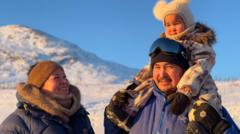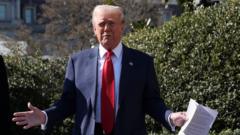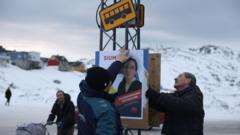Amid the icy fjords of Greenland, locals express discontent and concern over Trump's insistence that the territory could be controlled by the U.S., spotlighting broader aspirations for self-determination.
Trump’s Ominous Remarks Echo in Greenland's Frozen Landscape

Trump’s Ominous Remarks Echo in Greenland's Frozen Landscape
Residents of Greenland React to Trump's Threats Over Territorial Issues
As the sun creeps over the snowy peaks of Nuuk fjord, the tension surrounding Donald Trump’s anticipated presidency looms large over Greenland's tranquil settlements. Recently, Trump’s remarks about potentially acquiring Greenland by force have ignited discussions—raising eyebrows and prompting local residents to firmly assert their sovereignty. "Greenland belongs to Greenlanders," says a local fishing boat captain, emphasizing a sentiment heard repeatedly throughout the island.
In the small community of Kapisillit, where ice clings to the landscape and hunters prepare for the day, elder Kaaleeraq Ringsted reflects on his heritage. "It is unacceptable that he says this. Greenland is not for sale," he asserts earnestly, emphasizing his responsibility to pass on the traditional way of life to future generations.
Our journey through the icy waters leads us to Angutimmarik Hansen's modest farm, where he balances sheep farming with seal hunting. The biting cold does not deter his concerns over Trump’s flippant comments from afar. "What a stupid person in the world like Trump," he declares. Yet, he remains hopeful about their ties with the American people, noting, "We can work with the people of the USA."
Adding fuel to the fire, Trump’s son, Donald Trump Jr., made a fleeting visit to Nuuk, where he met a handful of locals and added his own focus on fostering relations. "It's been incredibly nice to meet people," he remarked. Businessman Jorgen Boassen, a self-confessed Trump supporter, echoed enthusiasm for potential trade opportunities but acknowledged that the island's sovereignty comes first.
As discussions of independence take center stage, local politicians like Kuno Fencker argue that Greenland should directly negotiate with the U.S. and not through Denmark, highlighting the island's desire for self-sufficiency and sustainability. "What is necessary here is that Greenland as a sovereign state should negotiate directly," he insists.
Navigating a path toward independence is not without challenges. Greenland receives significant financial support from Denmark, and the potential cost of autonomy weighs heavily on the minds of many. Maasana Egede, editor of a local newspaper, calls for a balanced perspective amidst the polarizing independence narrative, prioritizing a thriving living standard over haste for sovereignty.
The island's Prime Minister, Mute Egede, recently shared sentiments of national identity, affirming, "We do not want to be Danish, we do not want to be American, we want to be Greenlandic," spoken during a joint conference with Danish leaders. Both leaders acknowledge the lingering traumas of colonization, which complicate contemporary dialogues about independence and self-determination.
Environmental rights and the history of injustices inflicted on the indigenous Inuit people remain critical discussion points. Former finance minister Maliina Abelsen emphasizes the need for healing and acknowledgment of past wrongs, a sentiment that resonates deeply within the community. "You cannot move on if you have not been healed," she warns.
As these issues command attention, one thing remains clear: the future of Greenland should be determined by its people, far beyond the ramifications of political threats from leaders like Trump. The enduring message from across the ice and fjords is a collective refusal to be considered a mere pawn in geopolitical games.





















